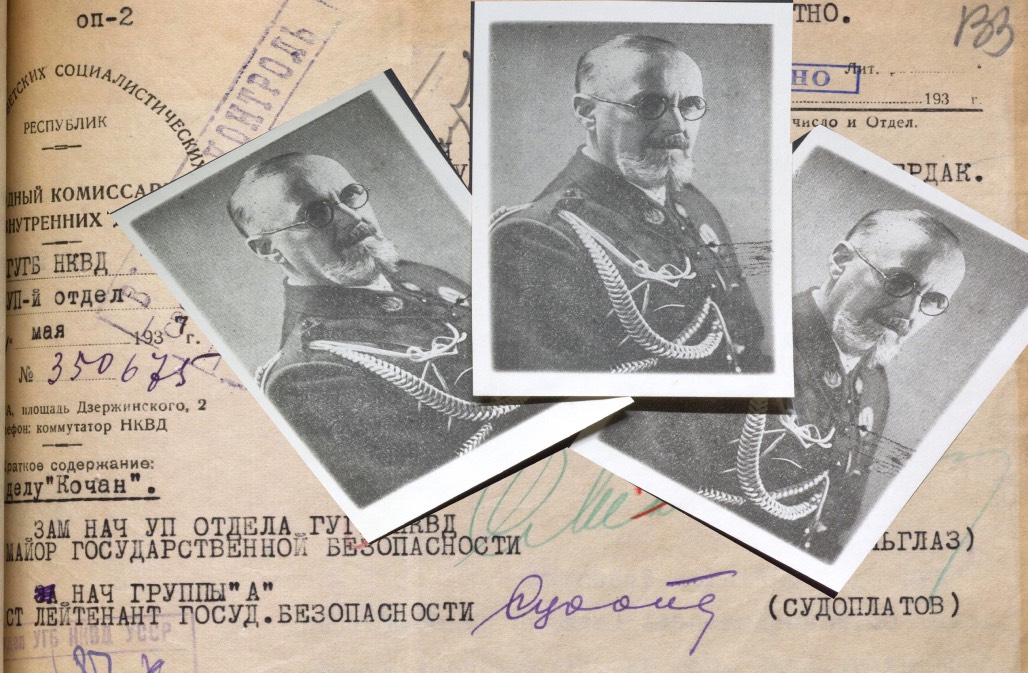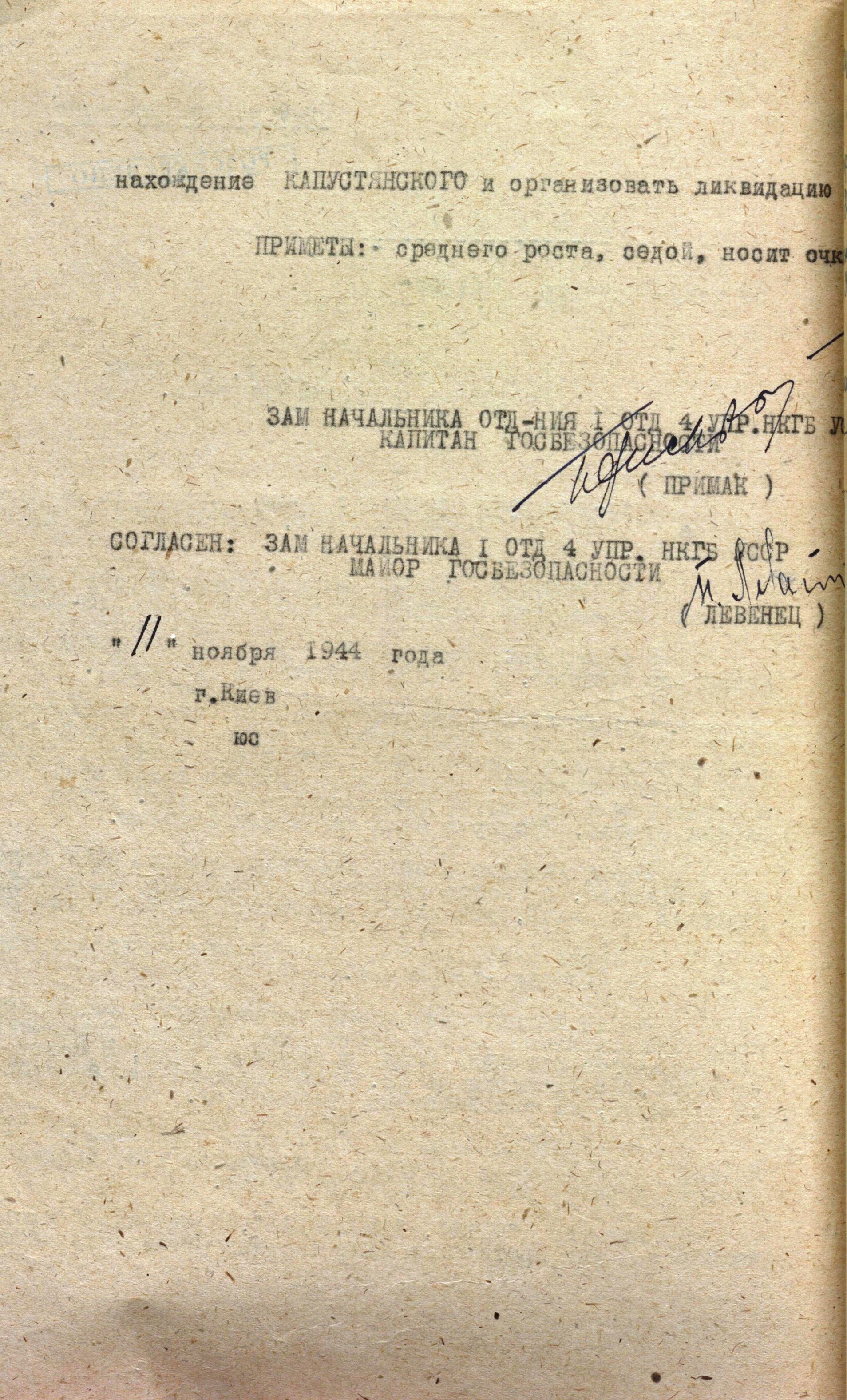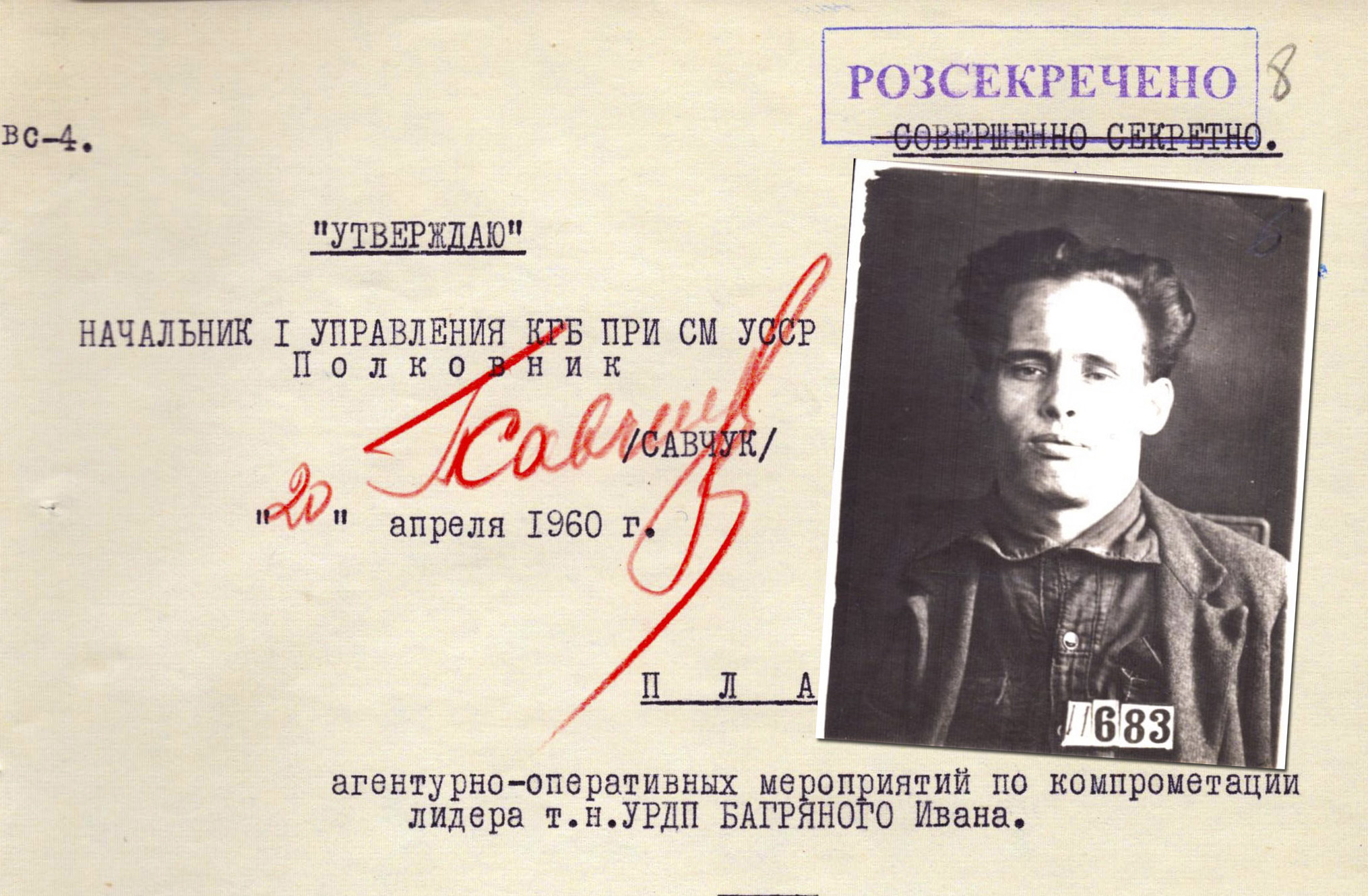Mykola Kapustyanskyi. One Footstep Away from the Planned Assassination by Soviet MGB Agents. Part 1.
2/11/2022

Part 1. To Track Down
Kapustyanskyi's name appears in many operational cases of the GPU, OGPU and the NKVD of the USSR in the 1920s and 1930s of active figures of Ukrainian emigration. This is not surprising, because the General was in the thick of events during the Ukrainian Revolution of 1917-1921, when the Bolsheviks repeatedly suffered from his skilful actions of the organizer of the liberation movement.
In the summer of 1917 he became one of the initiators of the formation of Ukrainian military units in the Russian army. At the same time he headed the Staff of the First Division of the First Ukrainian Corps under the command of Pavlo Skoropadskyi. He soon became Chief of Staff of the North-Western Front, where fierce battles with Bolsheviks continued. Under the Directory of the Ukrainian People's Republic, he served as Commander-in-Chief of Military Operations and held other positions in the General Staff of the Ukrainian People's Republic Army. In 1919 he headed the operational departments of the joint Armies of the Ukrainian People's Republic and the Ukrainian Galician Army during a joint campaign in Kyiv and Odessa. Then he participated in the development of a plan of the offensive operation, thanks to which almost all of Right-Bank Ukraine and Kyiv were liberated from Bolsheviks.
 After the remnants of the Ukrainian Army had left for abroad, he took part in the training of Ukrainian soldiers in Polish internment camps to maintain their skills and fighting spirit to restore Ukraine's independence. From 1923 he lived in Paris, where he was later elected chairman of the Ukrainian community in France, which had a society of former soldiers of the UPR Army. He was one of the founders of the Ukrainian Military Historical Society, a member of the Ukrainian Military Organization (UMO), headed by Colonel Yevhen Konovalets. In 1929 he became a participant in the First Congress of Ukrainian Nationalists in Vienna, where he was elected Deputy Chairman of the Presidium of the Congress. Later, he dealt mainly with military issues in the OUN's governing bodies, developed the OUN's basic program principles in the field of military construction, headed the Military Office of the Provid of Ukrainian Nationalists (PUN), and held other positions.
After the remnants of the Ukrainian Army had left for abroad, he took part in the training of Ukrainian soldiers in Polish internment camps to maintain their skills and fighting spirit to restore Ukraine's independence. From 1923 he lived in Paris, where he was later elected chairman of the Ukrainian community in France, which had a society of former soldiers of the UPR Army. He was one of the founders of the Ukrainian Military Historical Society, a member of the Ukrainian Military Organization (UMO), headed by Colonel Yevhen Konovalets. In 1929 he became a participant in the First Congress of Ukrainian Nationalists in Vienna, where he was elected Deputy Chairman of the Presidium of the Congress. Later, he dealt mainly with military issues in the OUN's governing bodies, developed the OUN's basic program principles in the field of military construction, headed the Military Office of the Provid of Ukrainian Nationalists (PUN), and held other positions.
Such a record of service could not go unnoticed by the OGPU bodies of the USSR, which at that time were actively working against Ukrainian emigrant organizations. First of all, the leaders were monitored. In one of the first documents attached to the case, M. Kapustyanskyi was immediately singled out as an important and influential figure in the emigrant environment, who deserved special attention.
It is a letter dated January 1934, from the Deputy Chief of the Foreign Department of the OGPU of the USSR Abram Slutsky to the Chief of the Foreign Department of the GPU of the Ukrainian SSR Volodymyr Karelin. It reads as follows: the Soviet intelligence station in Paris received information that representatives of the UVO Ye. Konovalets, R. Sushko, R. Yaryi and Ye. Lyakhovych were negotiating with the Japanese to establish a UVO mission in Manchuria, which was to be headed by M. Kapustyanskyi. The work there had to be organized in the so-called Green Wedge (a territory in the Far East of the USSR where Ukrainians lived compactly), as well as in units of the Special Far Eastern Army where many Ukrainians served. “In this regard”, the document said, “we are greatly interested in recruiting General Kapustyanskyo or a person close to him”.
At the same time, it was reported that operative sources characterized M. Kapustyanskyi “as a man highly educated, cultured and firm and honest in his beliefs.”. That is, it meant that it was not easy to recruit such a person, one needed to look for some weaknesses, work with close people, relatives, in particular to study his wife.
“In connection with the above, please inform us”, the letter said, “whether you have materials about Kapustyanskyi or his wife that would testify for or against this recruitment, as well as about Kapustyansky's own family ties in the USSR”. In further correspondence of Kapustyanskyi and his wife we will call them “Kochan” and “Tsvetnaya” respectively”(BSA of the SZR of Ukraine. – Case 10693. - Vol. 1. – P. 11-11).

Hence, the operational case was named “Kochan”. From further correspondence it became clear that it would be hard, even impossible to recruit Kapustyanskyi. So they abandoned this idea and began to closely monitor him and collect dossiers. Of the documents that came into the case in different years, of great value are the information about him from the track record kept in the archives of the Russian Empire, the memories of those who served side by side with him, characteristics made by close associates, information about close relatives, intelligence reports.
For example, at the request of the Central State Military-Historical Archive, which was subordinated to the NKVD of the USSR, a certificate was obtained on the basis of the record of Lieutenant of the 105th Infantry Regiment Kapustyanskyi Mykola Oleksandrovych, compiled on January 31, 1907. The document contains the date of birth - February 5, 1879. Until now, various studies have included other dates: February 1, 1879, February 6, 1880, March 30, 1881, and April 12, 1881. There are no differences with the place of birth. The future General was born in the ancient Cossack village of Chumaky, Tomakivka volost in Katerynoslav region (now Tomakivka district of Dnipropetrovsk region) in the family of a priest.
On the instructions of the Center, the Chekists searched for all close relatives of M. Kapustyanskyi who lived in the USSR. They were registered as “relatives of a member of the OUN Central Provid”. One of the documents states that “their arrest or eviction is being decided upon”.
The characteristics of M. Kapustyanskyi in operational documents are interesting. In particular, it is noted that in different periods he was close to both Pavlo Skoropadskyi and Symon Petliura. Petliura allegedly treated him particularly favorably as a member of the priest's family and as a person who also received his first education in a seminary. As well as for his democracy and independence in decision-making.
“One should definitely call him a man of culture and education”, says one of the documents, “who is not obsessed with marching, despite his having graduated from the Military Academy, he is interested in many social and technical issues. He deeply believes in and does not even doubt the colossal productive forces of Ukraine and its reunification with the West, in its great importance in the Black Sea basin and up to the deep north. And most importantly - in independence” (BSA of the SZR of Ukraine. - Case 10693. - Vol. 1. – P. 89).


It is emphasized that his connections and specific matters in the Ukrainian issue were not limited to participation in military circles and associations, but went further than the figures who then occupied a certain place in the politics of the UPR. It is noted that after 1920 he had offers to serve in the Polish army. But he flatly refused. He had nothing to do with any anti-Soviet organizations that did not belong to the Ukrainian orientation.
At the same time, in organizational matters, according to other archival documents, M. Kapustyanskyi had to contact representatives of the Russian emigrant organization ROVS (Russian All-Military Union), which united former soldiers of the White Army. Thus, in April 1934, an exchange of views on the Ukrainian issue took place in Paris between representatives of the ROVS and the OUN. M. Kapustyansky took part on behalf of the OUN. His statements at that meeting are special.
“What is the strength of Russian emigration?” - a foreign agent of the OGPU of the USSR quoted him. “We don't see it, what can we talk with them about? Our tasks are different”.
Then the agent writes that M. Kapustyanskyi rejected any possibility of cooperation with Russian emigrants. “If the Ukrainians had to wage an armed struggle to clear their lands of Muscovite power”, he said, “and at the same time Russian national forces began to fight for the overthrow of the Soviet government, there would be no place in Ukraine for Russian troops from where they could deploy” (BSA of the SZR of Ukraine. - Case 10693. - Vol. 1. – P. 115).
 Such statements and actions of M. Kapustyanskyi could not go unnoticed by the OGPU. Foreign operational sources stepped up surveillance. They reported that he worked closely with Ye. Konovalets and completely switched to organizing military affairs in the OUN, but maintained his ties with Generals V. Salskyi, V. Kushch, V. Petriv and others who joined the General Staff of the State Center of the UPR in exile, as well as with representatives of the Hetman movement.
Such statements and actions of M. Kapustyanskyi could not go unnoticed by the OGPU. Foreign operational sources stepped up surveillance. They reported that he worked closely with Ye. Konovalets and completely switched to organizing military affairs in the OUN, but maintained his ties with Generals V. Salskyi, V. Kushch, V. Petriv and others who joined the General Staff of the State Center of the UPR in exile, as well as with representatives of the Hetman movement.
They also reported that, given such extensive connections and authority in various circles of Ukrainian emigration, Ye. Konovalets sent him to the United States and Canada. This happened in 1935. And it was not the only trip. M. Kapustyanskyi had the task of promoting the ideas of the national movement and establishment of branches of Ukrainian nationalist organizations. But not just that. Overseas, he raised funds to organize the struggle to restore an independent Ukraine. This is mentioned in a number of reports, which refer to his bank account in Paris, to which were sent 400 pounds, 33 thousand French francs and other funds. It also mentions the participation of M. Kapustyanskyi together with a member of the OUN leadership Mykola Stsiborskyi in the preparation of negotiations with trade and industrial circles of Belgium over receiving 1 million francs for the OUN.
Special reports in this regard stated that the NKVD had taken decisive measures to prevent such contacts and to stop the activities of some OUN leaders. In fact, it meant liquidation. Yevhen Konovalets was the first to die at the hands of NKVD officer Pavlo Sudoplatov in May 1938. Sudoplatov's surname appears in many documents of M. Kapustyanskyi's cultivation. The General was approached closer and closer, and measures were even developed to recruit his wife. The Second World War became an obstacle and made adjustments to the work of the NKVD bodies against Ukrainian foreign centers, and some of their figures fell out of sight for a while.

The documents of the pre-war period also mention M. Kapustyanskyi's visit to the capital of Carpathian Ukraine, Khust, in January 1939, his participation in the II OUN Great Assembly in Rome in 1939, his joining the Melnik wing of the OUN, and his appointment as Chief of Staff of the OUN Provid, which moved to Krakow in April 1940, and that he, along with other officials, advocated a change of political orientation from Germany to England and France.
The NKVD began to find out where M. Kapustyanskyi was and what he was doing during the Second World War as early as May 1944, when a new case was opened against him. According to the materials, after the occupation of Ukraine, in 1941, as a member of the Ukrainian National Council, he came to Kyiv where he organized the Hetman Polubotko Ukrainian Military Society, which consisted mostly of soldiers of the UPR Army. After the liquidation of the Ukrainian National Council by the Nazis and the arrests of Ukrainian nationalists, he moved to Rivne, and from there to Lviv. There, in early 1944, he was arrested by the Gestapo, soon released, and was under surveillance for some time. Details of this are not disclosed.
The archives mention only M. Kapustyanskyi’s arrest in Lviv. At the same time, other sources state that in 1942 he was arrested by the Gestapo in Kyiv together with active members of the OUN, including Olena Teliha. Then, thanks to the efforts of Abwehr Colonel Alfred Bizanz, former Commander of the 7th Lviv Brigade of the Ukrainian Galician Army, which took part in the Kyiv operation of 1919, he was released.
Archival documents also show that M. Kapustyanskyi had a difficult relationship with both the Gestapo and the NKVD. He knew very well that nothing good was to be expected from the Soviet security services. But he had no idea that even then, in November 1944, the 4th Directorate of the NKVD of the USSR sent agents “Eagle”, “Mstyslav” and “Zakhidnyi” into the rear of the retreating Hitler’s troops to establish his whereabouts and organize liquidation.


As of March 1945, according to documents, NKVD agents could not locate M. Kapustyanskyi. It was the first attempt to kill him, poorly prepared, which was also hampered by the fact that the fighting situation at the front was changing rapidly. Under those circumstances, it was not easy for the sabotage group to operate in the deep rear in unfamiliar territory.
After the war, operational surveillance of M. Kapustyanskyi continued. During that period, he again immersed himself in socio-political and military-patriotic work. He often met with Ukrainian emigrants of various political persuasions who found themselves in camps for displaced persons, addressed them, and called for unity in order to win Ukraine's independence in the future.
One of the newspaper publications of that time (November 1947), attached to the case, quotes him as follows: “We must ask ourselves: are we ready for a final solution to the Ukrainian problem, do we have slogans that unite the people, can we use our power in the last, decisive battles. Therefore, over with discord and struggle among us, over with dividing and quarrels in the camps. Fighting for power, while sitting on foreign soil, is nonsense and disorganization of our forces.
… The General ended his lecture by addressing the youth about the need to form a united military-political front, which would allow us to end our struggle victoriously”. (BSA of the SZR of Ukraine. - Case 10693. - Vol. 1. – P. 235).
In 1948, M. Kapustyanskyi was appointed Minister of Military Affairs of the UPR government in exile. He was soon promoted to Lieutenant General and later to Colonel General. He became increasingly important among Ukrainian emigrants. So the leadership of the USSR State Security Service decided that something had to be done about the ardent and uncompromising general. Cultivation was entering the implementation phase with the involvement of new forces and means.


